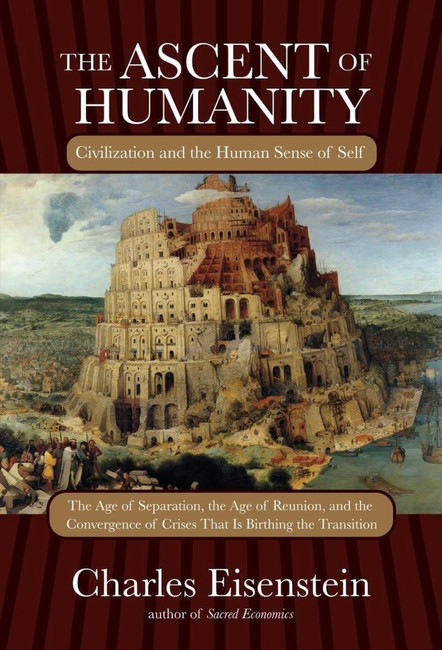Do We Really Need to Save The World? - Musings and Meditations’
- filipvk
- Jul 6, 2024
- 7 min read
Updated: May 29, 2025
“So much harm has been done in the name of saving the world. If you're on a crusade, then anything that helps your cause is good. In the name of the greater good, people replicate all of the same structures they're trying to change.”
Charles Eisenstein
“How do we change the world? Change the story.”
Charles Eisenstein
“Trust your intuition and be guided by love.”
Charles Eisenstein
Dear readers and followers of A Biosphere Project,
Last week I shared some thoughts on the answers that philosopher, activist and wise man Alan Watts gave to the question of whether life has a purpose, and whether it is all serious.
In doing so, I also talked about why even a solemn enterprise like saving the world should not become too serious, because then we are at risk of becoming zealots, bullies, fanatics or worse. Most wars were started by people who were on a mission to ‘make the world a better place’.
This week I have philosopher, climate thinker and activist Charles Eisenstein muse a bit further about the subject ‘saving the world’. And he immediately starts off with the notion that he is always wary when someone comes up with a plan to save the world.
In these four minutes Charles Eisenstein touches on a lot of fascinating questions and insights, in itself enough to muse on for a few months. Which shouldn't come as a surprise, because as far as I'm concerned, Charles Eisenstein is one of the leading thinkers on the meta-crisis, and the transition in which we find ourselves. And in doing so, he dares to think far "out of the box," more so than most of us are used to.
And Charles begins in this short video by stating that anyone who wants to save the world is at risk of thinking that the end justifies the means, and that whatever enables him or her to accomplish that mission is permissible.
Moreover, Charles continues, any attempt to save the world from our current way of thinking will run up against Albert Einstein's famous dictum that "no problem can be solved from the level of consciousness that produced that problem.”
And if we do try, we will make the same mistakes in that process as those against whom we “go to war” in order to save the world, and we will end up producing a new version of what we want to change or abolish.
Moreover, we also cannot avoid the observation that we keep confusing our (often unconscious) assumptions about the world with reality itself. Our belief systems that color and filter our perceptions of the world are not the same as reality itself. And from those belief systems, we will also keep coming up with the same wrong solutions, because we view problems too much through the lens of our beliefs.
For example, we still usually assume that in order to change the world, we have to exert a certain amount of force. You have to have some kind of power, you have to be able to reach a large audience, you have to be able to exert pressure, you have to be able to win a debate, and defeat an opponent by any means necessary. The whole of that idea is permeated by a "mindset" of clashing opposites. And that idea actually still comes from Newtonian physics: to make an object move (or stop), you have to apply a force to it. Without applying force, nothing happens.
But quantum physics has already shown that Newton's physics is only valid within a certain spectrum of reality, and that beyond that spectrum there are very different laws, or rather, very different possible patterns of behavior, relationship and possibilities for a transition to a new equilibrium in systems, both on the micro scale and on the macro scale.
And from this idea that the only possibility for change is to exert a very large degree of force on an existing system or equilibrium it seems impossible that there are other ways in which change can begin to manifest itself. But that idea is an aberration, and a consequence of the set of beliefs that define our worldview but do not necessarily reflect the actual course of events in this Universe. And as we come to understand that better, it also becomes clearer that any one of us can make a difference, even without having a big platform or megaphone, or without a million followers on social media.
Because Charles goes yet a step further: we are mistaken if we think that we are the only intelligence at work in the world. There is a greater intelligence operating in the whole, manifesting itself in sometimes very unexpected ways, and of which we are only one of the possible expressions.
Charles here gives only a brief hint at something that is a great taboo in our secular Western society: the idea that there is intelligence at work in the greater whole, intelligence that has nothing to do with "simple" Newtonian cause-and-effect sequences or blind and random interactions of elementary forces. Advancing an idea like that is to the science-minded Westerner like a somewhat ridiculous form of superstition, new age fantasy, or worse.
But there are great minds who also already perceive this intelligence from within the practice of science. For example, next week I will let the father of systems philosophy Ervin László do some musing in a short video. Ervin László (1932) is a true 'uomo universale': starting out as a child prodigy on the piano, he became a celebrated concert pianist, and through self-education he moved on to become a respected philosopher of science with a PhD from the Sorbonne University and four honorary doctorates, was offered chairs at the most prestigious universities in Europe and the US, was asked by the United Nations to lead all kinds of projects on 'governance' and applied systems theory. Moreover, he also co-authored the Club of Rome report, which for the first time outlined the way in which humanity is overshooting the what Earth can sustain.
Ervin László will talk briefly next week about our mission as humanity, and for him that mission is nothing short of "sacred," or holy. A sacred mission, doesn't that smell like a dangerous trajectory toward "saving the world"? Not really, for he calls that "sacred Misson”: learning to "dance with the planet," and that is something entirely different from “saving” her.
One of the most important of the numerous books Ervin László has to his name is entitled ‘The Intelligence of the Cosmos’. So that already echoes the same thing that Charles Eisenstein is coming to talk about.
But so more on that next week.
But to return to this brief musing by Charles Eisenstein: he goes yet one step further and says that we should also trust that that intelligence will make it clear to us what to do (at least: if we dare to listen), and will also put us in situations where we will be able to do "what it is ours to do”. You could translate that this way: trust your intuition (for some thoughts on intuition, see the musing ‘It's all magic’ from some weeks ago). Rather than relying on brute force and mechanistic cause-and-effect sequences, we need to open up to all forms of intuition and synchronicity that can point us in the direction of tuning into the processes that are already underway. What we need to do is align ourselves with what wants to emerge, and that is a very different kind of dynamic than exerting force. And that already resembles more "dancing with," rather than trying to control.
And that is a very hopeful idea that also gives each of us our 'agency' back. I very much like the word ‘agency’.
For as American philosopher and psychologist William James put it, "Act as if what you do matters, because it does!"
And that is something a lot of people no longer believe or feel.
There is a deep-seated sense of powerlessness that has so many of us in its grip and blocks endless amounts of energy and agency, and it does so because we easily believe that only power or strength can make a difference in the world, and that idea is something we need to leave behind collectively: what each of us does really does matter.
And I want to help spread that understanding: each of us has 'agency' and can help tip the collective. But we should not necessarily see that as 'saving the world', because then we are still stuck in the old thinking model. Rather, we need to start 'dancing with the world,' and in order to dance with someone, you have to be in connection with them: otherwise you will step on each other's toes. You have to sense where the other person is going and what movement might be next.
But that's what Ervin László will talk a little bit more about next week.
And the week after that, I give the stage to both Charles Eisenstein and Ervin László, in a particularly engaging dialogue and exchange of ideas they had recently.
Charles Eisenstein's website features his books, videos, essays and courses. His books include 'The Ascent of Humanity', 'Climate, A New Story', Sacred Economics', and The More Beautiful World Our Hearts Know Is Possible’. All highly recommended reading for those ready for a next-level perspective on the transitions we are going through. Do read the original English language editions; the Dutch translations of Eisenstein's work are not very good.
Charles Eisenstein will appear more in this blog , as he is one of those minds who dare to think far enough 'out of the box' to allow for a truly new way out of the maze to emerge. Along with brilliant people like Ervin László, who will be featured next week.
In the coming weeks and months, I'll also have some other scientists musing on intelligence and consciousness in the Universe. Neuropsychiatrist Iain McGilchrist will talk about consciousness and value as fundamental properties of the cosmos. Still a little later, I will have Bernardo Kastrup as a guest, a Dutch philosopher, computer scientist and systems thinker who is one of the scientists who postulate that consciousness is fundamental and non-reducible, in other words, that everything that exists is a consequence of consciousness rather than the other way around.
Also coming up in future musings are among others quantum physicist Amit Goswami, mathematician John Lennox and physicist Frederico Faggin (the inventor of the first microprocessor and a zillion other things like the touch-screen), and all have very fascinating things to say about their views on the universality of intelligence and consciousness.
We are actually living in particularly fascinating times, despite all the misery and converging disasters in the world. For we are on the eve of a change of paradigm and story, the like of which we haven’t seen often before. And the new story will be a quite exciting one. And it might show us very different paths to an existence in harmony with our planet.
So much for this episode, thank you for reading and watching,
All the best to you,
Filip















